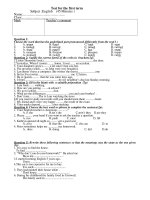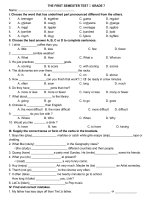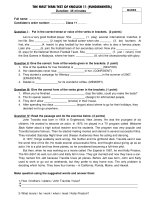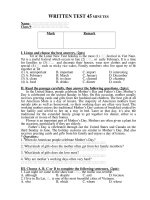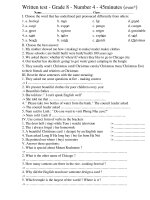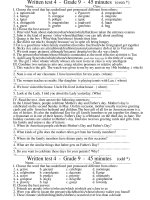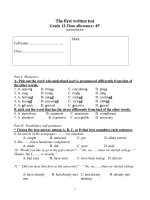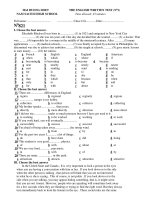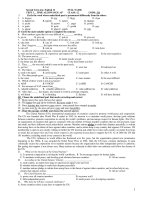The first written test Grade 12-Time allowance: 45’ pot
Bạn đang xem bản rút gọn của tài liệu. Xem và tải ngay bản đầy đủ của tài liệu tại đây (54.27 KB, 4 trang )
1
The first written test
Grade 12-Time allowance: 45’
*********
Full name:
Class:
Mark:
Part I- Phonetics:
A- Pick out the word who underlined part is pronounced differently from that of
the other words.
1. A. airports B. things C. calculators D. plays
2. A. says B. looks C. reads D. runs
3. A. beloved B. naked C. wicked D. confused
4. A. learned B. presented C. viewed D. robbed
5. A. advance B. ancient C. ancestor D. annual
B. pick out the word that has the stress differently from that of the other words.
6. A. marvelous B. argument C. maximum D. compliment
7. A. attention B. expensive C. acceptable D. necessary
Part II- Vocabulary and grammar:
* Choose the best answer among A, B, C, or D that best completes each sentences
8. An article in the newspaper………. my attention.
A. caught B. attracted C. got D. allare correct
9. She…… him a handsome compliment.
A. made B. did C. gave D. paid
10. ‘Would you like to go to the pop concert?’- “ No, we……when we started college “
Thanks, but I………it already.”
A. had seen B. have seen C. have been seeing D. did see
11. “ Did you meet Ann here at the university?’ - “ No, we……when we started college.
A. have already
met
B. had already met
C. had already
meeting
D. already met
2
12. This book is so long that I………
A. haven’t finished it
yet
B. haven’t
finished it already
C. still have
finished it
D. still haven’t
finished it already
13. The father used to be the…. of the household in Vietnam.
A. head B. leader C. president D. boss
14. The train ….half an hour ago.
A. has been leaving B. left C. has left D. had left
15. When I last saw her, she…….in NewYork.
A. is living B. was living C. has lived D. has been living.
16. “ your new dress is very nice, you look beautiful in it”- “ You must…….”
A. to kid B. kidding C. be kidding D. to be kidding
17. If you see your teacher… you, you can see a small friendly wave.
A. approach B. to approach C. approaching D. approached
18. People who can’t talk can use …… forms of communication.
A. verbal B. non-verbal C. verbly D. non-verbaly
19. I’m a student and I………everyday and every night.
A. study B. to study C. have studied D. studied
20. A large number of Indian men agree that it is unwise… in their wives.
A. confide B. to confine C. confiding D. confined
* Choose A, B, C or D that best completes the following passage
Mary(21)….from England. She(22)………(23)……to opera singing. Last month she (24)
……to Sydney, Australia in a few days. She(25)….also interested in(26)…….kangaroos
and koalas in wild forest there. She said that she hoped she(27)….another chance to
come to Australia.
21. A. come B. comes C. came D. has come
22. A. enjoy B. enjoys C. enjoyed D. has enjoyed
23. A. to listen B. listens C. listening D. listened
24. A. come B. comes C. came D. has come
25.A. is B. was C. has been D. had been
26. A. to watch B. watching C. watch D. watched
27. A. have B. will have C. would have D. has
Part III- Reading:
Read the reading passage and choose the item among A, B, C, or D that best
answer the question about the passage:
Many people think that we can learn a lot about the culture of a foreign country
simply by living in that country. However, this is not necessarily true. Often, the longer
3
we stay in a foreign country, the more we realize how little we actually know about the
culture of that country.
Books and talks about other people’s culture can even be dangerous because they
concentrate on cultural differences and exaggerate national character, and sometimes a
lot of information they contain is true.
In a study recently carried out in Britain, people were asked to make a list of
anything that they thought was typical of Britain and would interest a foreign visitor
there.Most mentioned Shakespeare; the Queen, village inns, English folk dancing,
English castles, and fish chips wrapped in newspaper. Although all of these characters
can be found in British culture, they do not show the real interest of ordinary British
people: (They are, in fact, simply stereotype- that is, general character which people
wrongly think are typical.) What is surprising is that they were suggested by British
people themselves as representing their culture. If people have such a wrong impression
of their own culture, how much false would their impression of other culture be!
28. If we stay a long in a foreign country,………
A. We will sometimes forget about culture of own country.
B. We can often learn a lot about the culture of the foreign country.
C. We will usually realise our own ignorance about its culture.
D. We can seldom find out anything at all about its culture.
29.It is hard to learn about a country’s culture from books because such books……….
A. concentrate on the dangers of the foreign culture.
B. exaggerate national character
C. take no notice of culture difference
D. contain little information about future
30. When we asked about their own culture, many British people……
A. argue they knew little about British culture
B. said themselves were not typical of British people
C. give incorrect answers
D. were surprised by the question asked
31. It is easy to……….
A. know a lot a bout your own country’ culture
B. know the culture of the other countries
C. give exact information about your own country
D. describe stereotype of your country
32. The things that are typical of Britain are…….
A. Shakespeare and the Queen
B. Shakespeare; the Queen, village inns, English folk dancing, English castles,
and fish chips wrapped in newspaper.
C. English folk dancing, English castles, and fish chips wrapped in newspaper.
4
D. fish chips wrapped in newspaper.
Part IV: Writing:
I-Choose the underlined part among A,B, C, or D that needs correcting.
33. London, which was the capital of England, was founded by the
A B C
Roman in 43 A.D.
D
34. The progress made in space travel for the early 1960s is
A B C D
remarkable.
35. Both a term paper and final exam is often required for a college
A B C D
class.
36. He said that they are going to attend a very important meeting on Sunday.
37. When we want to attract someone’s attention, we can use non
A B C
verbal form of communication.
D
II- Rewrite the sentences in reported speech
38-39. “I’ll buy you a new bike” ,My father said.
→ My father promised……………………………………………
40-41. “I’m study at home now” , She said.
→ She said…………………………………………………………
42-43.”I miss her a lot”, He said.
→ He said……………………………………………………………
44-45. “It was very kind of you to give me the present”, Mary said to Peter.
→ Mary thanked………
*The end*
